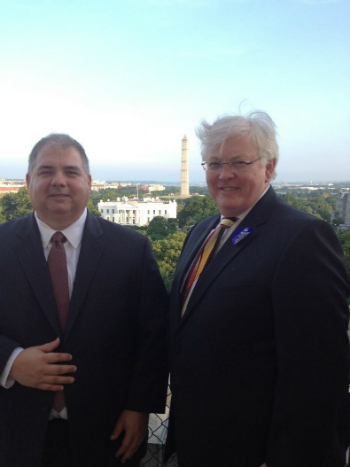
As McHenry Consulting celebrates their 15th year anniversary, it had us all talking about the past 15 years to when Barry and Dan first started off. Fifteen years is a long time, considering the average marriage lasts 8 years and the Small Business Administration (SBA) reports that half of small businesses survive five or more years.
So, Congrats McHenry, not only has your union contributed to much success in the PEO industry, just your duration alone is noteworthy. So, should we acknowledge or celebrate this moment. In the wise words of my colleague, Tina Vigoa, “Hell Yea, we should.”
It got me to thinking, outside of a few moments of reflection, should companies go out of their way to celebrate anniversaries? Is there benefit in reflection versus looking ahead? Does the old adage, how do you know where you are going, if you don’t know where you have been apply to businesses as well? Does deep reflection benefit organizations that are in a constant race for innovation?
There is a quote in my researching this topic that stood out to me. Judith Rodin, President of the Rockefeller Foundation said:
“Clearly, an anniversary is a good moment to recommit to what should never change.”
Companies certainly need to continual innovate in order to ensure they are around to celebrate their next anniversary. Businesses pace at warp speed and idle companies fail. There are some things though that should not change, and an anniversary is a perfect time to acknowledge and reaffirm that as a company. What are the constants in your company? When was the last time you gathered around and talked about how it all began?
Anniversaries provide employees the chance to commit and recommit to the original organizational purpose, which can be powerful. Some employees may not know what that original goal was? Employees who recognize that their roles contribute to a much loftier goal, have meaning in their work. Employees who see the meaning in their work are more committed and more productive.
McHenry Consulting entered as a firm that wanted to be a source of trusted counsel to PEOs and 15 years later, McHenry has cemented and expanded that position by continually meeting the needs of an evolving and dynamic industry, but staying true to a few constants:
- Creating a workplace that respects work life balance and has a culture of transparency and inclusion
- Creating a workplace that treats our clients like friends and our employees like family
- Creating incremental value for our clients by helping them achieving their goals
- Creating an environment where our employees can love what they do, and do what they love
Anniversaries are a good thing, it means you are still around, right? So how does a company continue to stick it out:
An Article titled Reflections on Corporate Longevity by Ian Davis, former managing director McKinsey Quarterly had some noteworthy thoughts, a sampling below. These Companies:
- relentlessly focus on their customers, and not just on their performance with customers but also on understanding what their best and most innovative customers are doing
- avoid introversion and actively seek to understand broader trends outside their own organizations and industries
- challenge legacy thinking and legacy mind-sets, encouraging—and tolerating the cost of—internal competition and cannibalization
- avoid hubris, by creating a culture of dissatisfaction with current performance, however good. Andy Grove was right—paranoia is helpful
- adopt a predominantly “grow your own” talent philosophy to create a robust and loyal culture but mix it selectively and judiciously with external hires. In times of fundamental and disruptive change, enduring companies must be willing to change their management
- do not tolerate extended tenures in top-management roles
- focus relentlessly on values and constantly demonstrate why they matter—the values of a company, to be meaningful, must be reflected in the key managerial processes, such as performance evaluation and appointments. A company’s values are judged by actions and behavior, not words and mission statements
- meaningfully and purposefully engage younger generations in formulating policy and organizational development, both to stimulate innovation and to prevent generational barriers. Conversely, new tech companies in Silicon Valley might think more about how to engage older managerial generations!

